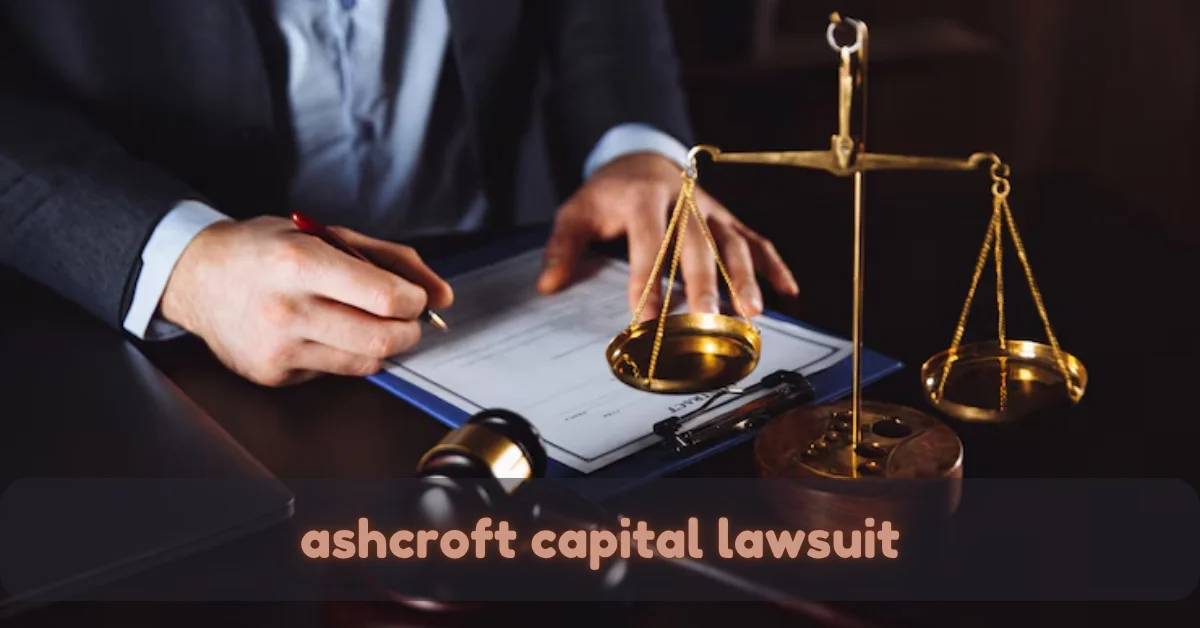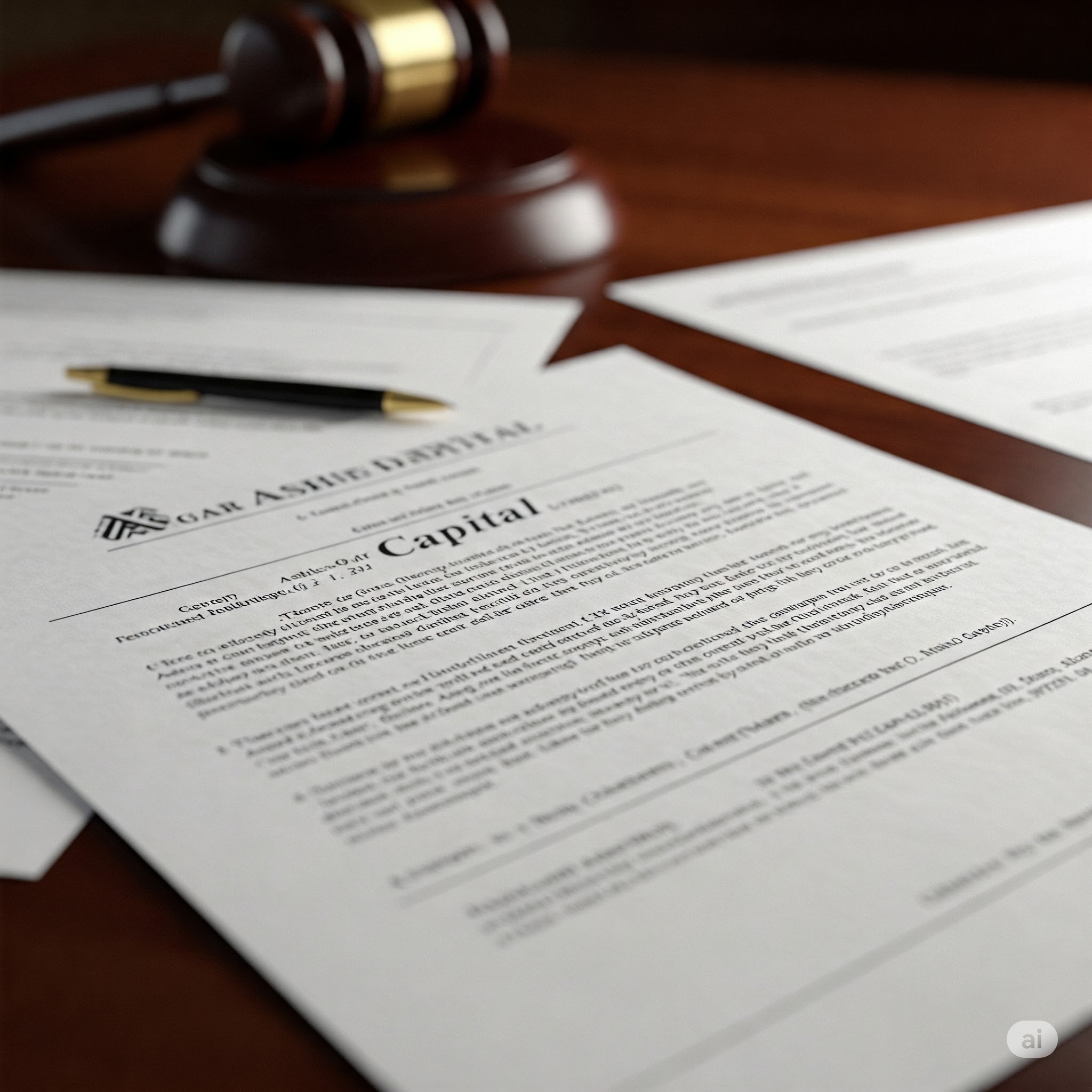Unmasking the Ashcroft Capital Lawsuit What Investors Need to Know
Introduction
Ashcroft Capital has long been a key player in the world of real estate syndication, offering passive income opportunities to investors looking for returns from multifamily assets. The firm has built a reputation based on trust, transparency, and consistent growth. Led by prominent industry names like Joe Fairless, Ashcroft Capital attracted attention with its value-add strategy, targeting underperforming apartment complexes with high upside potential. However, in recent times, the company has found itself at the center of legal controversy that threatens to undermine years of credibility.
The Ashcroft Capital lawsuit has raised serious questions about the integrity of real estate syndications and the protections available to passive investors. As the case unfolds, stakeholders are closely monitoring its implications on investment firms across the nation. Understanding this lawsuit isn’t just about one company; it offers insight into broader risks within private placement deals and investor rights. In this article, we explore the origins, allegations, consequences, and legal frameworks surrounding the Ashcroft Capital lawsuit and what it means for investors moving forward.
Background What Is Ashcroft Capital
Ashcroft Capital is a real estate investment firm that focuses primarily on multifamily apartment communities. Founded by Joe Fairless and business partner Frank Roessler, the company rapidly gained traction in the syndication space. With a mission to “improve the quality of life for residents and enhance value for investors,” Ashcroft became known for acquiring Class B properties in growing markets and implementing renovations to increase asset value.
The firm’s typical model involves pooling capital from accredited investors, acquiring multifamily properties, improving them through strategic upgrades, and either holding or selling at a profit. Through this model, Ashcroft Capital has amassed a portfolio valued at hundreds of millions of dollars. They have managed properties across key U.S. markets such as Dallas, Atlanta, and Tampa, which made the company a favorite among passive investors seeking diversification.
Joe Fairless, a well-known figure in real estate circles, also helped boost the firm’s profile through his “Best Ever Show” podcast and industry conferences. With a focus on education and investor relations, Ashcroft positioned itself as a reliable partner in multifamily investing. However, as with many fast-growing enterprises, scrutiny eventually followed.
The Lawsuit Origins Allegations and Legal Proceedings
The Ashcroft Capital lawsuit began gaining attention in late 2024 when a group of investors filed a formal complaint alleging serious breaches of fiduciary duty. The plaintiffs claimed that Ashcroft had misrepresented the financial stability and projected returns of several of its syndicated properties. According to court documents, some investors were allegedly misled about occupancy rates, renovation budgets, and expected cash flows at the time of acquisition.
Key among the allegations is that Ashcroft Capital withheld material information that could have influenced investment decisions. Investors argued that certain properties underperformed due to mismanagement or inflated projections. There were also accusations regarding undisclosed fees and insufficient communication regarding financial shortfalls. The legal battle has since expanded to involve forensic audits, discovery of internal communications, and expert testimonies from real estate analysts.
The legal proceedings are currently ongoing, with pre-trial motions and depositions underway. Ashcroft Capital has publicly denied wrongdoing, asserting that all investments carried inherent risks and that all necessary disclosures were provided. Despite this defense, the firm has seen increased scrutiny from regulatory bodies and investor watchdog groups. The outcome of this lawsuit could potentially set new precedents for how syndicators operate and communicate with their investors.
Investor Impact Financial Legal and Reputational Consequences
The Ashcroft Capital lawsuit has had immediate and far-reaching implications for current and former investors. One of the primary concerns is the financial fallout, as several properties under Ashcroft’s management have reportedly ceased distributions. For many passive investors relying on these monthly or quarterly payouts, the disruption has been significant.
Beyond financial losses, the lawsuit has sparked concerns over legal standing and recourse. Many investors are seeking legal counsel to understand their rights, particularly if they feel misled or uninformed during the syndication process. This has led to a broader discussion about the importance of due diligence and transparency in private equity real estate investments.
Reputationally, Ashcroft Capital is now facing an uphill battle. Once regarded as a top-tier sponsor in the multifamily space, the company has seen diminished trust from both investors and partners. Online forums, real estate conferences, and investor meetups are abuzz with discussions about the case, with many now reevaluating their investment strategies.
For passive investors, the case serves as a cautionary tale. While syndications offer attractive returns, they also come with risks that aren’t always apparent at the outset. The Ashcroft Capital lawsuit underscores the need for robust investor education, third-party verifications, and legal safeguards to ensure investor protection.
Legal Context Understanding Real Estate Syndication Lawsuits

Real estate syndications are structured partnerships where multiple investors pool capital to acquire income-generating assets. In these deals, the general partner (GP) manages the investment while limited partners (LPs) contribute funds and share in the profits. The trust between GPs and LPs is foundational, which is why legal frameworks around disclosures and fiduciary responsibility are so critical.
Lawsuits like the one facing Ashcroft Capital typically revolve around alleged breaches of fiduciary duty, securities fraud, or misrepresentation. Under SEC regulations, sponsors must provide accurate and full disclosure of risks, fees, and property-level details. Violations can trigger lawsuits, regulatory penalties, and even disbarment from future fundraising.
The Ashcroft case mirrors other high-profile syndication lawsuits, such as those involving larger real estate investment trusts (REITs) or crowdfunding platforms. In most cases, courts will examine whether the sponsor met the “reasonable person” standard in disclosing risks and acting in good faith.
It’s essential for investors to review offering memorandums, consult with legal advisors, and monitor sponsor behavior. Passive investing should not mean blind investing. Lawsuits like this serve as a wake-up call for both syndicators and investors to prioritize transparency, legal compliance, and ethical conduct in every transaction.
Responses and Industry Reactions
In response to the growing scrutiny, Ashcroft Capital has issued multiple public statements asserting their innocence and defending their track record. The company maintains that all investor documents were fully compliant with SEC guidelines and that any underperformance was due to macroeconomic factors beyond their control, such as rising interest rates and inflationary pressures.
Despite these defenses, the industry reaction has been largely critical. Financial advisors are warning clients to diversify their portfolios and demand more stringent reporting from syndicators. Some investment platforms have temporarily suspended listings associated with Ashcroft Capital or are advising additional vetting before committing funds.
Industry experts are also calling for reforms in how private placement deals are marketed and managed. Suggestions include standardized disclosure formats, third-party audits, and mandatory investor education before capital commitments. The Ashcroft Capital lawsuit has become a pivotal case study in real estate conferences and webinars, emphasizing the risks tied to opaque deal structures.
Social media sentiment has been mixed. While loyal investors continue to defend the firm’s overall performance, a growing number of voices are expressing disappointment and urging regulatory intervention. The controversy has triggered wider conversations about passive investing, fiduciary ethics, and sponsor accountability.
Future Outlook What Comes Next for Ashcroft Capital
As the legal process continues, Ashcroft Capital faces a critical juncture in its corporate journey. If the lawsuit results in settlements or unfavorable judgments, the company may need to restructure operations, reevaluate leadership, or halt new acquisitions. There is also the potential for increased regulatory oversight, including restrictions on future fundraising.
For investors, the next steps will likely involve navigating complex legal channels, joining class action suits, or negotiating direct settlements. Some may choose to divest from current holdings or reallocate funds to more transparent and institutionally backed offerings. Others will likely wait for the dust to settle before making final judgments.
On a broader scale, the Ashcroft Capital lawsuit could spur lasting changes in the syndication space. Expect more calls for accountability, legal protections, and proactive communication between GPs and LPs. Sponsors may also begin adopting new technologies for transparency, such as blockchain-based ledgers for tracking investor funds and property performance in real time.
Ashcroft Capital, if it survives this controversy, will need to focus on rebuilding trust. That could include overhauling its investor relations strategy, enhancing reporting systems, and publicly demonstrating lessons learned. Whether the firm can regain its reputation remains uncertain, but the lessons for the industry are already clear.
Conclusion
The Ashcroft Capital lawsuit stands as a major development in the world of real estate investing, with ramifications that extend far beyond one company. For investors, it highlights the vital importance of due diligence, transparency, and legal literacy when engaging in passive investment opportunities. For sponsors, it serves as a stark reminder that reputation and compliance are as valuable as any asset in a portfolio.
While the legal outcomes remain uncertain, the industry has already begun to react. Tighter standards, increased scrutiny, and louder calls for reform are likely to shape the future of syndication. In the end, whether you’re an investor or a syndicator, the Ashcroft Capital case reinforces one essential truth: trust, once broken, is not easily restored.
FAQs
What is Ashcroft Capital best known for?
Ashcroft Capital is known for its real estate syndication model, focusing on multifamily value-add investments across the U.S.
Who filed the lawsuit against Ashcroft Capital?
A group of investors who participated in Ashcroft’s syndicated deals filed the lawsuit, citing misrepresentation and financial mismanagement.
What are the main allegations in the lawsuit?
Allegations include withholding material information, overstating performance metrics, and breaching fiduciary duties.
How can real estate investors protect themselves legally?
Investors should perform due diligence, consult with attorneys, and carefully review offering memorandums before investing.
Is Ashcroft Capital still operating despite the lawsuit?
Yes, the company is still operating but under increased scrutiny and legal pressure.
What role did Joe Fairless play in the controversy?
As a co-founder, Joe Fairless has been named in the lawsuit and is central to the allegations made by investors.
How common are lawsuits in real estate syndications?
While not common, lawsuits can occur, especially in cases involving poor performance, lack of transparency, or regulatory violations.
Where can I find court documents related to the case?
Court filings can typically be accessed through public records or legal databases such as PACER.
What should I do if I invested with Ashcroft Capital?
Consult a legal professional to explore your rights and consider joining any class action if applicable.
What impact does this case have on the reputation of other real estate syndicators?
It has raised investor awareness and may lead to increased scrutiny across the entire industry, prompting higher standards for all syndicators.







Post Comment